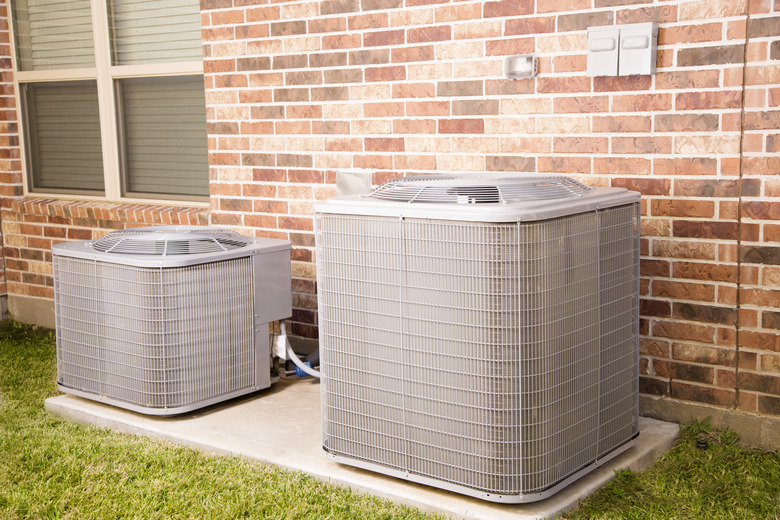What Size Air Conditioner Do I Need For A 1,650 Sq. Ft. House?
We may receive a commission on purchases made from links.
Sizing an air conditioning unit to a house is a matter of calculating the square footage, converting the square footage to British thermal units (BTUs), and adjusting for specific rooms. BTUs is a type of measurement used to determine the amount of energy to control the temperature of a space. Choosing the right type of air conditioner unit for a 1,650-square-foot house should be done after evaluating the size and BTU needs of each room.
This method of calculating is an estimate and should be used for quick calculations. An HVAC professional can do the measurements and calculations using a more approved method. In many cases, the more approved method will be necessary for local permits if replacing a central air conditioning system.
Tip
To determine the size of air conditioner needed for a 1,650-square-foot-home, calculate the square footage, convert to BTUs and convert to tonnage. For a 1,650-square-foot home, the common size is a 3.5-ton system, but various features of your home could change that calculation. Window air conditioners are based on a specific room's square footage.
Calculate the Square Footage
Calculate the Square Footage
Real estate agents calculate square footage based on living space. When looking for an air conditioner unit, the calculation is a little different. Multiply each room's length by the width to get a room-specific measurement. Include hallways and other areas, such as laundry rooms, in the calculations.
Do not include closet spaces or areas that will not be connected to the unit. Sealed-off rooms, such as basements or attics, are not measured unless you plan on installing ducts leading into these rooms.
Converting Measurements to BTUs
Converting Measurements to BTUs
While BTUs are the measurement of heat generated in a room, air conditioner units reverse that to measure the amount of heat removed from a room. Convert the square footage for each room to BTUs. For example, 100- to 150-square-foot rooms equal 5,000 BTUs; 150- to 250-square-foot spaces convert to 6,000 BTUs; and 250 to 350 square feet equal 7,000 BTUs.
Multiply the square footage of rooms larger than 350 square feet by 25 for the average BTUs. Add 4,000 BTUs for kitchens and 1,000 BTUs for laundry rooms and bathrooms. Add the BTUs for each room together to determine the total BTU needs for a house.
Converting BTUs to Tonnage
Converting BTUs to Tonnage
Most split-system air conditioner units, the most common type found in modern homes, measure the output based on tons. Converting the home's BTUs to tons is a matter of dividing the square footage calculation by 12,000. A 1,650-square-foot house, when divided properly, equates to approximately 3.5 tons.
The calculation is based on multiplying 1,650 by 25 to get the approximate BTU needs and dividing the total by 12,000. You should still measure BTU needs individually to get a more accurate representation. Assuming the house has a kitchen, three bathrooms and a laundry room, the tonnage would actually be 4.5 tons.
Choosing an Air Conditioner Unit
Choosing an Air Conditioner Unit
Window units and ductless units use zone control. Zone control focuses the cooling on specific rooms, and the air conditioner sizing is based on the room's square footage. By limiting the cooling to specific rooms, the energy bill can be moderately reduced. You'll need multiple window air conditioners based on individual room size to cool your home effectively. For example, a 6,000-BTU window air conditioner cools small rooms up to about 250 square feet.
A mini-split ductless system will cool a house more evenly. It uses air handlers in each room connected to the outdoor condenser. Choosing the right size based on the tonnage will allow you to keep your electric bill lower than with window units. However, installation of a split-system is a substantially higher upfront cost.
Sizing a system too big or too small can have an impact on your home and energy bill. Selecting an air conditioner that's too big can affect not only the initial cost but the temperature and humidity of the home. Choosing one too small will increase your energy bill and may never keep up with the demand. Be sure to double-check with a professional.
